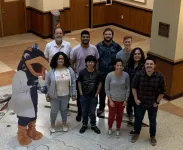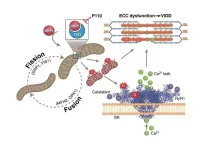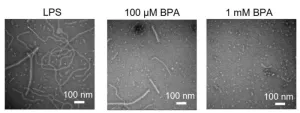(Press-News.org) BACKGROUND
One of the hallmarks of cancer cell development is its dependence on sugar, especially glucose, to grow and divide. Scientists have long been studying how to restrict or block this process that promotes tumor growth, called glycolysis, from happening as a possible effective strategy against cancer.
Previously, researchers from the UCLA Health Jonsson Comprehensive Cancer Center identified a specific protein sodium glucose transporter 2, or SGLT2, as a mechanism that lung cancer cells can utilize to obtain glucose. Drugs that inhibit SGLT2 are already FDA approved for other conditions and the UCLA team found these drugs could also delay the development of lung cancer and improved survival when tested in mice, suggesting these drugs could be repurposed for lung cancer treatment.
However, while inhibiting glycolysis can slow down the growth of tumors, the researchers found it can also make cancer cells more aggressive, making the cancer harder to treat. This led the team to look at other mechanisms of resistance in the tumors that still grow while being treated with SGLT2 inhibition that may link glucose restriction to increases aggression.
FINDINGS
Researchers found that by restricting glucose in lung cancer cells, it caused the cells to lose their specialized features, making them more aggressive. This change was linked to alteration in certain molecules and how they modify DNA structure. One of those molecules was alpha-ketoglutarate, which plays a pivotal role both in energy metabolism and in gene regulation. Reduced levels of this molecule affected how genes are turned on and off, activating HIF1α, a transcription factor known to play a role in making cancer cells more aggressive.
This led the researchers to discover a specific set of genes, controlled by HIF1α, that could predict how aggressive a cancer might be, giving physicians important information that can help guide treatment decisions. The team also found potentials ways to block the tumor from becoming more upset, or greedy, when deprived of its nutrients.
“While we still need to further explore the intricacies of this mechanism, our findings point to a potential therapeutic strategy using a combination of treatments involving epigenic modulators or HIF inhibitors to counter the unintended effects of glucose restriction,” said senior author of the study Dr. Claudio Scafoglio, assistant professor of pulmonary and critical care medicine at UCLA and member of the UCLA Health Jonsson Comprehensive Cancer Center.
IMPACT
This study provides crucial insights into the role of glucose restriction in driving an aggressive phenotype in lung cancer. The discovery suggests a new possible combination approach to treat early-stage lung cancer, using a glucose inhibitor and an epigenetic inhibitor that are already available for other conditions that can help reduce tumor growth and offset aggressive behavior. More work is underway to find the right approach to prevent starvation-induced de-differentiation without causing significant side effects.
JOURNAL
The study was published in the journal Cancer Research, a journal of the American Association for Cancer Research.
AUTHORS
The senior author is Dr. Claudio Scafoglio, assistant professor of pulmonary and critical care medicine at UCLA and a member of the UCLA Health Jonsson Comprehensive Cancer Center. The study’s first author is Pasquale Saggese, a postdoctoral scholar in the Scafoglio Laboratory.
Other UCLA authors include Aparamita Pandey, Martin Alcaraz Jr., Eileen Fung, Abbie Hall, Jane Yanagawa, Erika Rodriguez, Tristan Grogan, Orian Shirihai and Dr. Steven Dubinett.
FUNDING
This work was supported in part by the American Cancer Society and the National Cancer Institute.
END
New strategy may halt tumors' aggressive response to glucose deprivation
UCLA-led study could potentially lead to new combination treatments for early-stage lung cancers
2023-11-07
ELSE PRESS RELEASES FROM THIS DATE:
Giles Robinson, MD, named director of the Neuro-Oncology Division at St. Jude Children’s Research Hospital
2023-11-07
St. Jude Children’s Research Hospital today announced Giles Robinson, M.D., has assumed the role of director for the Department of Oncology’s Division of Neuro-Oncology. He has also become co-leader of the Neurobiology and Brain Tumor Program within the St. Jude Comprehensive Cancer Center. These combined units comprise one of the largest clinical brain tumor programs in North America.
“Dr. Robinson has been an exemplary member of St. Jude since joining as a hematology/oncology fellow in 2007,” said Julie R. Park, M.D., Department of Oncology ...
MD Anderson and Jazz Pharmaceuticals announce five-year collaboration to evaluate zanidatamab in HER2-expressing cancers
2023-11-07
HOUSTON and DUBLIN ― The University of Texas MD Anderson Cancer Center and Jazz Pharmaceuticals plc today announced a five-year strategic research collaboration agreement to evaluate zanidatamab, Jazz’s investigational HER2-targeted bispecific antibody, in multiple HER2-expressing cancers.
The collaboration will combine MD Anderson’s translational medicine and clinical research expertise with Jazz’s expanding oncology drug development capabilities to investigate the potential of zanidatamab as monotherapy and in combination with other treatments for patients with different tumor types and stages. This includes its possible applicability ...
An ammonia trail to exoplanets
2023-11-07
They reveal the origin of wine, the age of bones and fossils, and they serve as diagnostic tools in medicine. Isotopes and isotopologues – molecules that differ only in the composition of their isotopes – also play an increasingly important role in astronomy. For example, the ratio of carbon-12 (12C) to carbon-13 (13C) isotopes in the atmosphere of an exoplanet allows scientists to infer the distance at which the exoplanet orbits its central star.
Until now, 12C and 13C bound in carbon monoxide were the only isotopologues that could be measured in the atmosphere of an exoplanet. Now a team of researchers has succeeded in detecting ammonia isotopologues ...
Online shopping for tobacco products rises with California flavor restrictions
2023-11-07
Online shopping for cigarettes and vaping products increased significantly in the weeks following the implementation of SB-793, a 2022 California law prohibiting the sale of flavored tobacco products. Researchers at the Herbert Wertheim School of Public Health and Human Longevity Science at University of California San Diego identified potential loopholes in tobacco control policies due to the absence of explicit regulations on e-commerce sales in retailer licensing programs.
Reporting in the journal Tobacco Control on Nov. 7, 2023, researchers assessed the ...
UTSA researchers discover new method to inhibit cholera infection
2023-11-07
Karl Klose, director of The South Texas Center for Emerging Infectious Diseases (STCEID) and the Robert J. Kleberg, Jr. and Helen C. Kleberg College of Sciences Endowed Professor, coauthored a research article with Cameron Lloyd ’23, a UTSA doctoral student who graduated in August with a Ph.D. in molecular microbiology and immunology under the guidance of Klose.
The research paper investigates a novel strategy for inhibiting the spread and infection of Vibrio cholerae, the bacteria responsible for the disease, cholera.
The research article is entitled, “A peptide-binding ...
The molecular basis of ventilator-induced diaphragm weakness
2023-11-07
A study presents evidence that mitochondrial fragmentation is a proximal mechanism underlying ventilator-induced diaphragm dysfunction (VIDD)—and identifies a possible therapeutic to limit diaphragm atrophy during a stay in intensive care. Previous research has established that many of the cellular pathways responsible for VIDD are kicked off by oxidative stress stemming from diaphragm inactivity. Stefan Matecki and colleagues studied the molecular causes of this oxidative stress in mice. Just six hours on mechanical ventilation was enough to increase expression of dynamin-related protein 1 (DRP1), which is involved in mitochondrial ...
Bisphenol A and asthma in mice
2023-11-07
The “hygiene hypothesis” posits that allergic asthma can be triggered by a childhood environment that is too clean and sterile. One studied mechanism underlying this relationship is the influence of microbial lipopolysaccharides (LPS), which train the immune system. In the absence of LPS, Toll-like receptors in the human body will become more sensitive, which can lead to an exaggerated allergic response to triggers such as house dust mites. Mingliang Fang and colleagues explored how the environmental pollutant bisphenol ...
Mountain goats seek snow to shake off insects
2023-11-07
Losing summer snow patches may hit mountain goats hard, according to a study that suggests that goats seek out snow to avoid biting insects. Many cold-adapted species take advantage of patches of snow that linger through the summer, as corridors for travel, sources of drinking water, zones for cooling off, or places to play. As the climate changes, many species will have reduced access to snow patches. Forest Hayes and Joel Berger explored what this lack of summer snow might mean for mountain goats (Oreamnos americanus) in Glacier National Park, which has lost 85% of its glaciers since 1850. The team studied goats in the park—along with another population 1,000 ...
Mapping the landscape: Amsterdam UMC receives millions to lead European research into obesity
2023-11-07
Obesity is a growing health problem that disproportionately affects people and communities with a low socio-economic position in Europe. Thanks to a Horizon grant worth more than 10 million euros, Jeroen Lakerveld, epidemiologist at Amsterdam UMC, is now set to lead a European consortium in better identifying the causes of obesity and designing guidelines to tackle the problem.
"Social and cultural factors play a role in our lifestyle behaviours but so do our genes and the environment in which we live and work. Residents of neighbourhoods are not equally exposed to unhealthy factors: ...
Guilt not as persuasive if directly tied to personal responsibility
2023-11-07
PULLMAN, Wash. – Invoking a sense of guilt—a common tool used by advertisers, fundraisers and overbearing parents everywhere—can backfire if it explicitly holds a person responsible for another’s suffering, a meta-analysis of studies revealed.
While guilt is widely used to try and persuade people to act, research has been mixed on its effectiveness in spurring behavior change. This analysis, published in the journal Frontiers in Psychology, found that overall guilt had only a small persuasive effect, which is in line with previous research.
However, researchers uncovered that guilt worked better ...
LAST 30 PRESS RELEASES:
Science reveals why you can’t resist a snack – even when you’re full
Kidney cancer study finds belzutifan plus pembrolizumab post-surgery helps patients at high risk for relapse stay cancer-free longer
Alkali cation effects in electrochemical carbon dioxide reduction
Test platforms for charging wireless cars now fit on a bench
$3 million NIH grant funds national study of Medicare Advantage’s benefit expansion into social supports
Amplified Sciences achieves CAP accreditation for cutting-edge diagnostic lab
Fred Hutch announces 12 recipients of the annual Harold M. Weintraub Graduate Student Award
Native forest litter helps rebuild soil life in post-mining landscapes
Mountain soils in arid regions may emit more greenhouse gas as climate shifts, new study finds
Pairing biochar with other soil amendments could unlock stronger gains in soil health
Why do we get a skip in our step when we’re happy? Thank dopamine
UC Irvine scientists uncover cellular mechanism behind muscle repair
Platform to map living brain noninvasively takes next big step
Stress-testing the Cascadia Subduction Zone reveals variability that could impact how earthquakes spread
We may be underestimating the true carbon cost of northern wildfires
Blood test predicts which bladder cancer patients may safely skip surgery
Kennesaw State's Vijay Anand honored as National Academy of Inventors Senior Member
Recovery from whaling reveals the role of age in Humpback reproduction
Can the canny tick help prevent disease like MS and cancer?
Newcomer children show lower rates of emergency department use for non‑urgent conditions, study finds
Cognitive and neuropsychiatric function in former American football players
From trash to climate tech: rubber gloves find new life as carbon capturers materials
A step towards needed treatments for hantaviruses in new molecular map
Boys are more motivated, while girls are more compassionate?
Study identifies opposing roles for IL6 and IL6R in long-term mortality
AI accurately spots medical disorder from privacy-conscious hand images
Transient Pauli blocking for broadband ultrafast optical switching
Political polarization can spur CO2 emissions, stymie climate action
Researchers develop new strategy for improving inverted perovskite solar cells
Yes! The role of YAP and CTGF as potential therapeutic targets for preventing severe liver disease
[Press-News.org] New strategy may halt tumors' aggressive response to glucose deprivationUCLA-led study could potentially lead to new combination treatments for early-stage lung cancers






